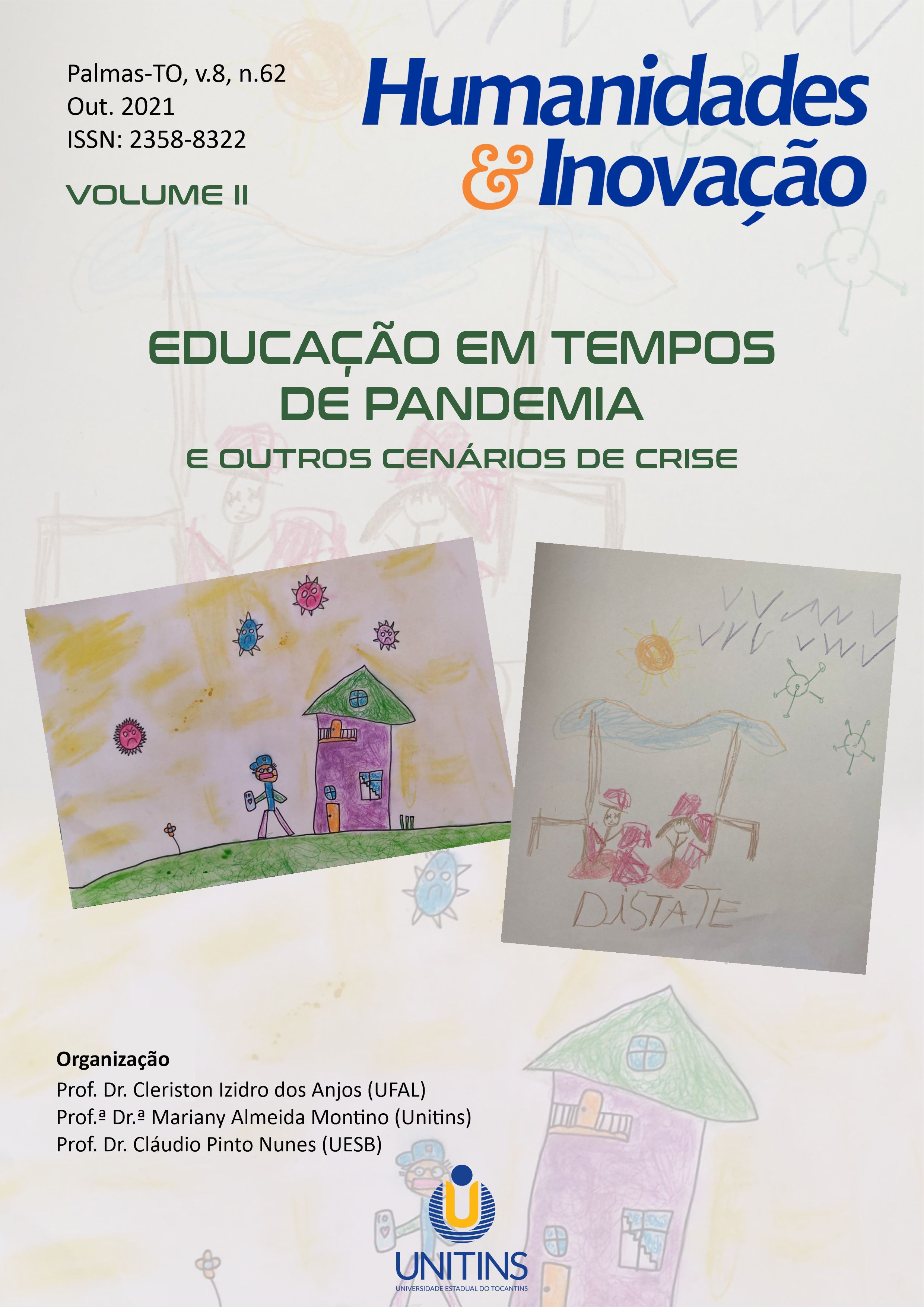DE PEQUENOS A GRANDES LEITORES: A MEDIAÇÃO DA LEITURA COMO MECANISMO IMPULSIONADOR DO PROTAGONISMO INFANTIL NA HORA DA HISTÓRIA
Abstract
Ouvir que a criança tem a dizer sobre suas percepções e memórias relacionadas à história narrada nos momentos de leitura nem sempre ocorre, o que minimiza seu papel nesse ato de formação e prazer, pois considera-se equivocadamente que ouvir a narrativa é muito mais importante do que dar voz à infância. Nessa perspectiva, objetiva-se verificar em que medida atividades com literárias contribuem para a promoção do letramento emergente de crianças. Para tal, foi adotado o seguinte percurso investigativo: (1) Aplicação do roteiro de Leitura; (2) Momentos de leitura, utilizando a estratégia do RECALL e (3) Avaliação dos resultados. Ao final da pesquisa, os alunos demonstraram habilidades de linguagem oral mais consolidadas, ampliaram seu vocabulário, melhoraram a construção narrativa, demonstraram grande interesse em propostas literárias, passaram de ouvintes a contadores de histórias e adquiriram conhecimentos sobre o mundo da escrita.
References
ANTUNES, Jéssica Maís. Literatura Infantil: Construindo práticas pedagógicas para o desenvolvimento da linguagem. Dissertação (Mestrado em Letras) – Universidade Feevale. Novo Hamburgo, 2020.
BAJARD, Élie. Da escuta de textos à leitura. São Paulo: Cortez, 2007.
BAJOUR, Cecília. Ouvir nas entrelinhas. O valor da escuta nas práticas de leitura. São Paulo: Pulo do Gato, 2012.
BAMBERGER,Richard. Como incentivar o hábito da leitura. Tradução de Octavio Mendes Cajado. SP: Cultrix,1977.
BARBOSA, Márcio Ferreira. Experiência e narrativa. Salvador: EDUFBA, 2003.
BRASIL. Ministério da Educação e do Desporto. Secretaria de Educação Fundamental. Referencial curricular nacional para a educação infantil, vol. 3. Brasília: MEC/SEF, 1998.
BRITTO, L. P. L. Ao revés do avesso. Leitura e formação. São Paulo: Pulo do Gato, 2015.
CARVALHO, Ana Carolina; BAROUKH, Josca Aline. Ler antes de saber ler. Oito mitos escolares sobre a leitura literária. São Paulo: Panda Books, 2018.
COELHO, B. Contar histórias – uma arte sem idade. São Paulo: Ática, 2002.
COLOMER, Teresa. A formação do leitor literário. São Paulo: Global, 2003.
COLOMER, Teresa. Introdução à literatura infantil e juvenil atual. São Paulo: Global, 2017.
DOYLE, B. G. & BRAMWELL, W. Promoting emergent literacy and social–emotional learning through dialogic reading. The Reading Teacher, 59(6), 2006, p. 554-564.
ERGÜL, C., AKOĞLU, G., KARAMAN, G. & SARICA, A.D. Effects of Dialogic Reading Program on Later Reading Skills: Follow-Up Study. Journal of Theoretical Educational Science, 10(2), 2017, p. 191-219.
FREIRE, P. A Importância do ato de ler: em três artigos que se completam. 22. ed. São Paulo: Cortez, 1988.
GIL, A. C. Como elaborar projetos de pesquisa. 5. ed. São Paulo: Atlas, 2002.
GILLEN, J; HALL, N. The emergence of early childhood literacy. In J. Marsh, J. Larson & N. Hall (Eds), The handbook of early childhood literacy. 2ª ed. London: Sage, 2013. p. 03-17.
HAVELOCK, Eric. A equação oralidade-escritura: uma fórmula para a mente moderna. In: OLSON, David; TORRANCE, Nancy. Cultura e oralidade. Tradução de Valter Lellis Siqueira. São Paulo: Ática, 1995. p. 17-34.
JOUVE, Vincent. Por que estudar literatura? São Paulo: Parábola, 2012.
LAJOLO, Marisa; ZILBERMAN, Regina. Literatura infantil brasileira: história & histórias. 4 ed. São Paulo: Ática, 1988.
LAJOLO, Marisa. Literatura ontem, hoje, amanhã. São Paulo: Editora UNESP, 2018.
OLIVEIRA, Mª. Alexandre de. Dinâmicas em literatura infantil. São Paulo: Paulinas, 2009.
PRODANOV, C. C. Manual de metodologia científica. 3. ed. Novo Hamburgo, RS: Feevale, 2013.
SARAIVA, J. A. Literatura e alfabetização: do plano do choro ao plano da ação. Porto Alegre: Artmed, 2001.
SARAIVA; MUGGE. Literatura na escola. Porto Alegre: Artmed, 2006.
SMITH, M.W.; DICKINSON, D.K. Early Language and Literacy Classroom Observation (ELLCO). Toolkit, Research Edition. Baltimore: Brookes Publishing, 2002.
SULZBY, E.; TEALE, W. H. Emergent literacy. In: BARR, R.; KAMI, P. M.; MESENTHOL, P.; PEASON, P. D. (Eds.). Handbook of reading research. New York: Longman, 1991. p. 727 - 757.
SULZBY, E.; TEALE, W. H.; KAMBERELIS, G. Emergent writing in the classroom: home and school connections. In: STRICKLAND, D.; MORROW, L. (Eds.). Emerging literacy: young children learn to read and write. Newark, D. E: International Reading Association, 1989. p. 63 - 79.
VYGOTSKY, L. S. A formação social da mente. 4. ed. São Paulo: Martins Fontes. 1991.
WHITEHURST, G. J.; FALCO, F. L.; LONIGAN, C. J.; FISCHEL, J. E.; DEBARYSHE, B. D.; VALDEZ MENCHADA, M. C.; CAULFIELD, M. Accelerating language development through picture book reading. Developmental Pyschology, 24(4) 1988.
WHITEHURST, G. J.; LONIGAN, C. J. Child development and emergent literacy. Child development. 69(3), 1998.
ZANATA, Deisi Luiza.; VERARDI, Fabiene. O orfanato da SRTA. Peregrine para crianças peculiares. Um olhar para a formação de jovens leitores. In: CARVALHO, Diógenes Buenos Aires de; VERARDI, Fabiane; SÁ, Paula Fabrisia Fontinele de (Orgs.). Quando se lê a literatura infanto e juvenil, o que se lê? Como se lê? Rio de Janeiro: Bonecker, 2019.
ZEVENBERGEN, A. A.; Whitehurst, G. J.; Zevenbergen, J. A. Effects of sharedreading intervention on the inclusion of evaluative devices in narratives of children from low-income families. Journal of Applied Developmental Psychology, 2003.
ZILBERMAN, Regina. A literatura infantil na escola. 4 ed. São Paulo: Global, 1985.
ZILBERMAN, Regina. A leitura e o ensino da literatura. Curitiba: Intersaberes, 2012.
ZILBERMAN, Regina. A literatura infantil brasileira. Rio de Janeiro: Objetiva, 2005.
Copyright Notice
The submission of originals to this periodic implies in transference, by the authors, of the printed and digital copyrights/publishing rights. The copyrights for the published papers belong to the author, and the periodical owns the rights on its first publication. The authors will only be able to use the same results in other publications by a clear indication of this periodical as the one of its original publication. Due to our open access policy, it is allowed the free use of papers in the educational, scientific and non-commercial application, since the source is quoted (please, check the Creative Commons License on the footer area of this page).











